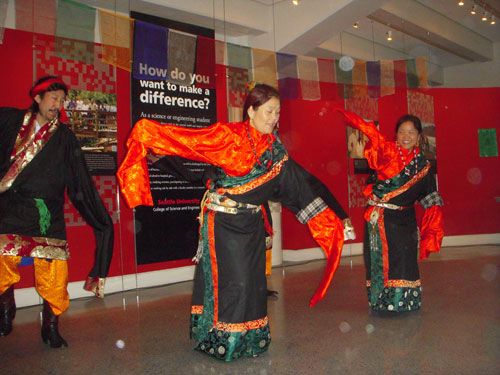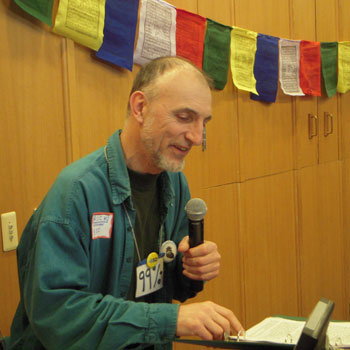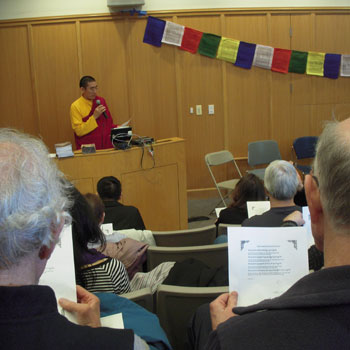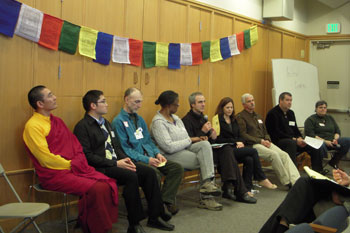
Tibetan folk dancers from the group “Gaba Sha Trul,“ celebrated their culture during a performance halfway through the session.

“Buddhist Practice and Social Transformation,” the 2012 Annual Gathering
A group of about 60 people vigorously discussed social change, and Buddhist dharma, during the 2012 Northwest Dharma Association annual gathering March 17.
The day-long event, in Wyckoff Auditorium at Seattle University, started with snow outside and ended with sun, as the people inside exchanged perspectives on how to best apply Buddhist teachings to the need for political, environmental and societal change.
To Elaine Waller-Rose, active in the Seattle Buddhist Peace Fellowship, the bridge is natural.
“What is necessary is an interest in contemplative practice, and an interest in how you use yourself, and your energies, to further the beings in the world,” she said.
Most participants seemed to agree that Buddhist practice isn’t at all in opposition with taking social, political or environmental action, arguing that engagement in the world is embedded in the Buddha’s original teachings.

Rich Harlan, a leader in Buddhist Peace Fellowship Seattle, makes a point in his presentation about social action and the dharma.
“Zen has been from the very beginning an ecological practice,” said Jason Wirth, co-director of EcoSangha, and a professor at Seattle University. “EcoSangha stresses the ecological side of the practice, not as an add-on, but as what has always been fundamental.”
A sense of urgency underlay much of the discussion, with people expressing concern about the degeneration of the global environment, and other signs of rising global difficulties in the future.
Because of this Terran Campbell, who is both a Buddhist practitioner and an activist, said she is more focused on “collective” than “individual” enlightenment.
“We’re in trouble, we’re really in trouble, and I just hope we can get it together and take action,” she said.
She quoted Vietnamese teacher Thich Nhat Hahn: “If we continue abusing the earth this way, there is no doubt our civilization will be destroyed.”
Kurt Hoteling, who conducts mindfulness trainings for military veterans suffering from post-traumatic stress disorder, and who also leads wilderness mindfulness kayak trips, said he thinks sometimes people feel distanced from the problems facing the world.
“So much of what prevents us humans from meeting the challenges we face ecologically, is we don’t feel in ourselves, and in our bones, how much is at stake,” he said.
At times there were disagreements, such as how essential non-violence is in social action, and what non-violence means from a Buddhist perspective.

Ven. Tulku Yeshe Gyatso, a monk from Sakya Monastery in Seattle, spoke movingly of compassion, and the situation of people in Tibet.
For instance Rick Harlan, an organizer in Seattle Buddhist Peace Fellowship, said that sometimes a tactic that includes property damage, such as cutting through a fence around a military installation, may be within the sphere of non-violence if makes an effective statement about the larger violence in the culture.
“There’s non-violence as passivity, then there’s active, aggressive, peaceful non-violence,” he said.
One woman from the audience protested that such tactics risked getting too far away from the Buddha’s teachings of kindness.
“When it is OK to hurt another? Never,” she said, adding that an underlying axiom must be “Do no harm.”
Ven. Tulku Yeshe Gyatso, a monk of Tibetan origins from Sakya Monastery in Seattle, spoke movingly of the sacrifices made by 28 Tibetans nationals who have self-immolated in protest against Chinese control of their culture.
Then he turned the discussion toward compassion, even on the level of the smallest living beings in one’s own back yard.
“If you don’t want to help the small beings in your kitchen or yard, how can you think about world peace?” he asked.
His remarks were preceded by a colorful performance of Tibetan folk dances by “Gaba Sha Trul,” a troupe of Tibetan dancers from the Kham region of eastern Tibet.
Despite some differing views, an appreciation of the efficacy of the Buddha’s teachings underlay the discussions.
“I think it’s a fine balance, but if we keep the understanding of Buddhist teachings, of the ethical life and moving forward into intention, we’ll learn in the moment what needs to be done. What needs to be done is whatever needs to be done to end suffering,” said Rachel Moriah Beals, co-founder of Seattle Dharma Punx, a Capitol Hill meditation group.

In the afternoon, a panel shared views on Buddhism and social action. From the left: Ven Tulku Yeshe Gyatso, Sith Chaisurote, Rick Harlan, Elaine Waller-Rose, Denis Martynowych, Rachel Moria Beals, Kurt Hoelting, Jason Wirth, and Terran Campbell.
Denis Martynowych, executive director of Cloud Mountain Retreat Center, and a person who primarily practices in the Theravada tradition, suggested inner awakening is needed to accomplish enlightened social change.
“Social transformation and Buddhism, the profound opportunity that Buddhism brings, is really grounded in the understanding of non-self, that comes out of deep practice,” he said. “I invite us to come back to the basic teachings as we come back to the bigger questions of social transformation.”
Several there discussed post-traumatic stress disorder, suggesting a link between people’s inner traumas, their actions in the world, and the possibility that healing can help improve societal conditions.
Emerging from the short break-out sessions near the end of the gathering, one person said he’s come to appreciate his growing understanding of his own inner pain as a doorway to bring greater compassion to helping others heal their traumas.
“The most useful thing for me was the reminder that the pain that is always there is an opportunity to understand the pain that other people are in,” he said.
At the end the mood turned celebratory and joyful, as people chanted together and sent blessings and light out to each other, and to all beings in the world.